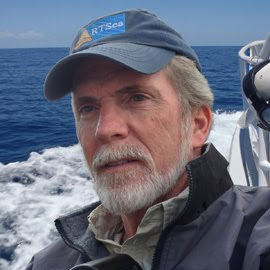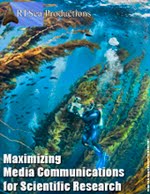 Coral reefs continue to face challenges and occasional glimmers of hope. But they lead a perilous existence, with these important tropical marine ecosystems living on the edge of collapse. As remnants of geological island movements, coral reefs form important barriers to island erosion and other weather- and ocean-related conditions (storms, currents, etc.) while also providing a home for countless numbers of marine species.
Coral reefs continue to face challenges and occasional glimmers of hope. But they lead a perilous existence, with these important tropical marine ecosystems living on the edge of collapse. As remnants of geological island movements, coral reefs form important barriers to island erosion and other weather- and ocean-related conditions (storms, currents, etc.) while also providing a home for countless numbers of marine species.Bad News: Toxic Algae Acts Quickly
On the down side, researchers are discovering that algae can not only crowd out corals when their growth explodes due to nitrate-rich pollution (as previously studied worldwide), but algae blooms can also prove to be toxic by reducing oxygen and sunlight. And it can happen with remarkable speed.
Recently, in the Gulf of Oman, scientists were conducting a coral reef study and upon returning to their research area three weeks after an algae bloom, they found the corals seriously impacted. Several species of hard corals, including cauliflower and tabletop hard corals, were completely destroyed.
"We were surprised at the extent and speed at which changes to the coral reef communities were affected," said marine ecologist Andrew Bauman in the BBC News. Scientists have known that climate change in the form of warmer waters can adversely affect the coral, causing "coral bleaching" whereby the coral is severely and often fatally weakened from the loss of the symbiotic zooxanthellae algae that literally lives in the coral tissue.
While warmer temperatures can stress the corals to the extant that coral bleaching occurs, the scientists in the Gulf of Oman now have dramatic evidence of the impact of algae blooms in open water, literally choking the life from the coral - not to mention the impact on other sealife including fish, whose gills can be become clogged with algae particulates.
Good News: Island Nations Work Together
On the more positive side, tropical island nations are becoming more proactive in their efforts to protect their national treasures - the coral reefs. In 2007, the governments of Indonesia, the Philippines, Malaysia, Timor Leste, Papua New Guinea, and the Solomon Islands formed the Coral Triangle Initiative to establish policies to protect their marine reef ecosystems. Realizing the importance of the reef ecosystem not only as a component of a healthy ocean but also of economic importance as a source of food and tourism for developing nations, the Coral Triangle Initiative is a government-led program supported by leading conservation organizations like Conservation International.
 In the Indian Ocean, the Maldives - a nation of over 1,100 coral islands - recognizes the economic power of conserving its surrounding coral reefs. The reefs are the lure to worldwide scuba divers, snorkelers, and swimmers, making tourism a major component of the nation's economy. In addition, the need to protect its ecology - in fact, that of the world - is of critical importance to the Maldives. The islands are, at most, just under five feet above sea level. With sea levels rising due to global warming, scientists estimate that the Maldives will be uninhabitable by 2100.
In the Indian Ocean, the Maldives - a nation of over 1,100 coral islands - recognizes the economic power of conserving its surrounding coral reefs. The reefs are the lure to worldwide scuba divers, snorkelers, and swimmers, making tourism a major component of the nation's economy. In addition, the need to protect its ecology - in fact, that of the world - is of critical importance to the Maldives. The islands are, at most, just under five feet above sea level. With sea levels rising due to global warming, scientists estimate that the Maldives will be uninhabitable by 2100.The government has taken steps to both protect its citizens and the environment by instituting a variety of eco-friendly policies including installation of wind turbines, rooftop solar arrays, and phasing out fossil fuel-burning boats and cars. In July, 2010, they also outlawed shark fishing and the sale or export of shark fins. But the government is also reluctantly prudent and developing plans for the relocation of its entire population of 400,000 as sea levels rise.
Maldives President Mohamed Nasheed warned, “Climate change is a global emergency. The world is in danger of going into cardiac arrest, yet we behave as if we've caught a common cold. Today, the Maldives has announced plans to become the world's most eco-friendly country. I can only hope other nations follow suit.”
Read about toxic algae in the BBC Earth News.
Read about the Coral Triangle Initiative at Conservation International.
Read about the Maldives at Mother Nature Network.

















No comments:
Post a Comment